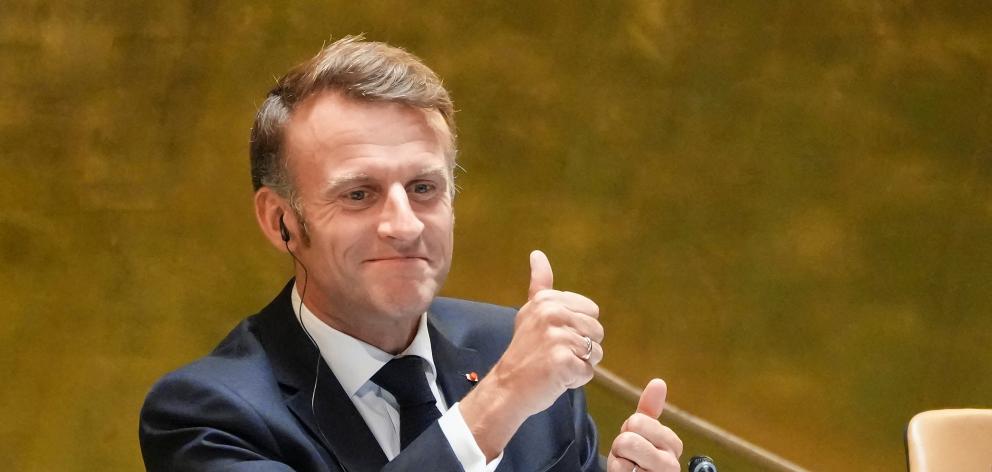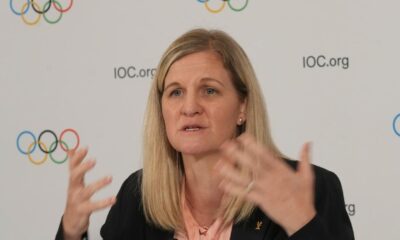Politics
Global Leaders Support Palestinian Statehood Amid Ongoing Conflict

World leaders are increasingly rallying behind Palestinian statehood as French President Emmanuel Macron announced on September 25, 2023, that France would officially recognize Palestine as a state. This declaration came during a session at the United Nations in New York, convened with representatives from various nations, including Saudi Arabia. Although this recognition could bolster Palestinian morale, analysts suggest that it is unlikely to lead to significant changes on the ground, particularly given the current political landscape in Israel.
The backdrop to this announcement is the ongoing conflict following the October 7, 2023, attack on Israel by Hamas, which resulted in the deaths of approximately 1,200 people. In response, Israel has intensified its military operations in Gaza, claiming over 65,000 Palestinian lives, based on local health authorities’ reports. The Israeli government, described as the most far-right in its history, has maintained a firm stance against the establishment of a Palestinian state, declaring its intent to continue military actions against Hamas.
Macron emphasized the need for peace, stating, “We must pave the way for peace… to preserve the very possibility of a two-state solution, Israel and Palestine living side by side in peace and security.” His remarks were met with lengthy applause from the audience, reflecting international support for the recognition of Palestinian statehood.
International Reactions and Implications
Alongside Macron, Turkish President Tayyip Erdogan, Canadian Prime Minister Mark Carney, and UN Secretary-General Antonio Guterres were among the leaders who participated in the event. Spanish Prime Minister Pedro Sanchez, whose government recognized Palestine in 2024, noted the significance of two permanent Security Council members—France and the United Kingdom—acknowledging Palestine.
The recent wave of recognition has expanded to include countries such as Luxembourg, Malta, Belgium, and Monaco, joining the ranks of over three-quarters of the 193 UN member states that already recognize Palestine. Palestinian President Mahmoud Abbas, who was unable to attend the meeting due to visa issues, called for further recognition, urging nations to support Palestine’s bid for full UN membership.
Despite these developments, a significant hurdle remains. Full UN membership for Palestine requires approval from the Security Council, where the United States holds veto power and has expressed opposition to Palestinian recognition, stating it could exacerbate regional tensions.
Challenges Ahead: Israeli Response and European Division
Israeli officials have condemned the recognition efforts, with Israeli UN Ambassador Danny Danon asserting that such issues should be resolved directly between Israel and the Palestinians. Prime Minister Benjamin Netanyahu has consistently rejected calls for recognizing a Palestinian state, insisting on the necessity of dismantling Hamas before any diplomatic progress can be made.
While many European nations are moving towards recognizing Palestine, some, including Germany and Italy, have indicated a reluctance to follow suit in the near future. Germany, historically a strong ally of Israel, has begun to critique Israeli policies, asserting that recognition should result from a political agreement towards a two-state solution. Italy has expressed concerns that recognition could be counterproductive.
As tensions rise, Israel is considering annexing parts of the occupied West Bank in response to international recognition efforts, a move likely to further complicate relations with countries in the region. The United Arab Emirates, a key player in the Middle East after normalizing ties with Israel in 2020, warned that annexation could undermine existing agreements.
In a related address, Australian Prime Minister Anthony Albanese highlighted the humanitarian crisis in Gaza, referencing the deaths of aid workers and civilians, including Australian citizen Zomi Frankcom. Albanese reiterated Australia’s commitment to recognizing Palestine, contingent on the Palestinian Authority’s commitment to reforms and elections.
As the situation develops, the urgency for a resolution to the Israeli-Palestinian conflict appears increasingly critical. Without renewed negotiations, the prospect of a two-state solution risks fading from international discussions, leaving many to wonder about the future of peace in the region.
-

 Sports2 months ago
Sports2 months agoNetball New Zealand Stands Down Dame Noeline Taurua for Series
-

 Entertainment2 months ago
Entertainment2 months agoTributes Pour In for Lachlan Rofe, Reality Star, Dead at 47
-

 Entertainment1 month ago
Entertainment1 month agoNew ‘Maverick’ Chaser Joins Beat the Chasers Season Finale
-

 Sports2 weeks ago
Sports2 weeks agoEli Katoa Rushed to Hospital After Sideline Incident During Match
-

 Sports2 months ago
Sports2 months agoSilver Ferns Legend Laura Langman Criticizes Team’s Attitude
-

 Politics1 month ago
Politics1 month agoNetball NZ Calls for Respect Amid Dame Taurua’s Standoff
-

 Sports1 week ago
Sports1 week agoJamie Melham Triumphs Over Husband Ben in Melbourne Cup Victory
-

 Entertainment3 months ago
Entertainment3 months agoKhloe Kardashian Embraces Innovative Stem Cell Therapy in Mexico
-

 World3 months ago
World3 months agoPolice Arrest Multiple Individuals During Funeral for Zain Taikato-Fox
-

 Sports3 months ago
Sports3 months agoGaël Monfils Set to Defend ASB Classic Title in January 2026
-

 Entertainment2 months ago
Entertainment2 months agoTyson Fury’s Daughter Venezuela Gets Engaged at Birthday Bash
-

 Sports2 months ago
Sports2 months agoHeather McMahan Steps Down as Ryder Cup Host After Controversy





















